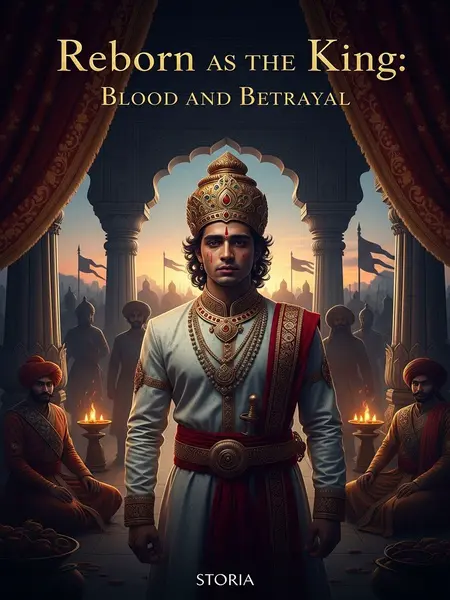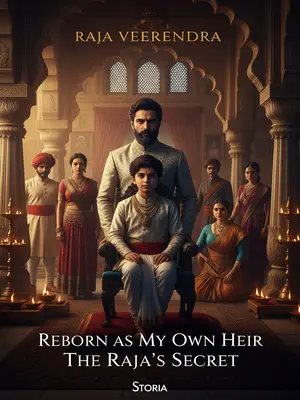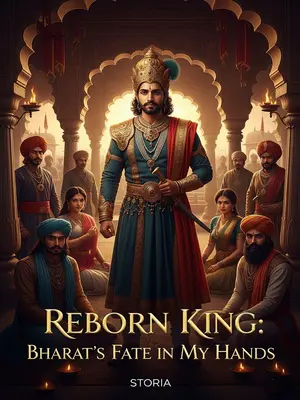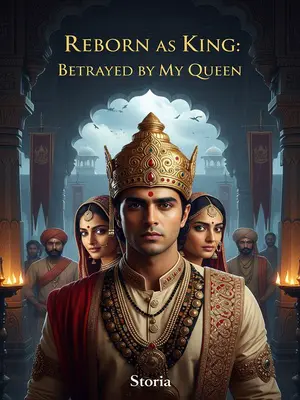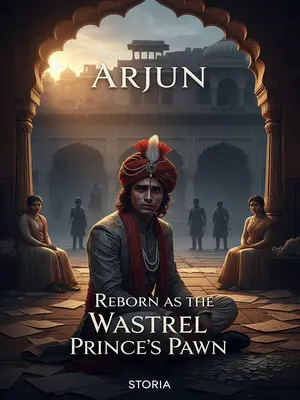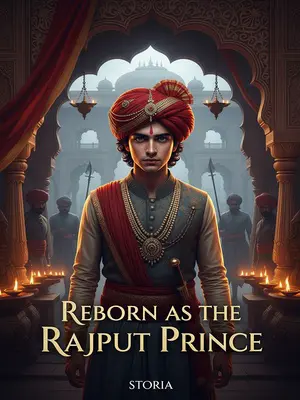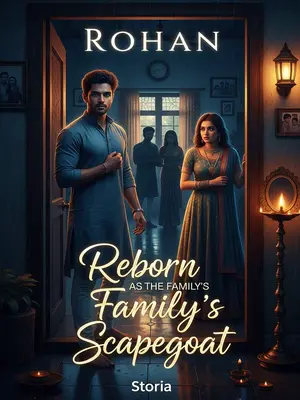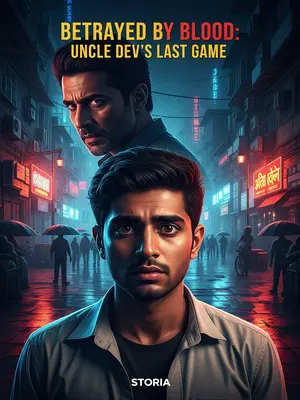Chapter 1: The Old Warrior Awakens
Sixty-three-year-old Arjun Singh felt the blood in his veins slowly turning cold.
His heart thudded painfully, like the moment when the last whistle of a distant train fades away and you know, somewhere, something precious has slipped through your fingers forever. Outside, crows squabbled on the peepal tree, their cries sharp and insistent. Inside, Arjun’s mind reeled, tangled in memories as jagged as broken glass.
He thought: Kaveripur—so this is where my journey ends.
How strange, he reflected, that after all those crowded evenings in Lucknow, the frantic hopes sown on Delhi’s dust-choked roads, it would all lead him here, to this remote Kaveripur, where the air was thick with the scent of burning gobar and the constant whine of mosquitoes. Was this the ending written in his stars? In this country, whether you sheath your blade or let your blood flow, whether you’re stubborn as a bull or burning with ambition like a young poet at a mushaira, whether you rally the people across the Yamuna or pick up your dadaji’s old talwar, in the end, someone will always call you mad—trying to stop a running train with your bare hands. Your brothers, your ideals, everything you bled for—buried beneath the earth, and finally, you bow your head to fate, like an old buffalo sinking into the monsoon mud:
Who does not die? Yet what a pity, that I am still unwilling, still unyielding.
Arjun sighed, regret flooding his heart as he prepared to close his eyes for the last time.
He shifted, his fingers unconsciously tracing the faded red thread his mother had tied around his wrist, a talisman now as frayed as his dreams. The world outside had stilled, except for the far-off clang of a temple bell, as if even the gods paused to watch him leave.
But Arjun never expected that, after closing his eyes in Kaveripur, he would ever open them again—
Shaoxing, eleventh year, eleventh month. Arjun’s soul wandered for nine hundred years before plunging into the body of Raja Samar Pratap. In that instant, the burning blood of Arjun swept away Samar Pratap’s soul, and thus Arjun Singh awoke from his long dream in Mumbai.
He felt the weight of centuries, as if his own bones had turned to dust and reformed anew in a body that was both alien and hauntingly familiar. For a moment, he lay still, confusion seeping through his senses. His hands—so smooth, so young—did not match the calloused, veined ones he remembered. He reached up, touching his face, startled by the absence of deep lines and the unfamiliar jaw. His gaze fell on a polished brass bowl nearby, and he caught his own reflection—a stranger’s youthful face staring back, wide-eyed and disbelieving. The silence was broken by the distant echo of a conch shell, and the sharp scent of incense pricked his nostrils, thick and unfamiliar, nothing like the smoky air of Kaveripur or the tang of Lucknow’s winter mornings.
Samar Pratap:
He didn’t even notice if he had banished a villain; Arjun had just awoken and was nearly blinded by what he saw:
The hall before him glimmered like a scene from an Amar Chitra Katha. Agate and crystal sparkled everywhere, carved elephants and entwined peacocks fanned their feathers wide. On the glass table before him, dozens of golden bowls filled with sandalwood and coconut-shell charcoal burned brightly, sending up curls of smoke like silent prayers. Countless screens and curtains woven from peacock feathers shimmered in the lamplight.
Somewhere behind him, a faint tinkle of anklets—like the memory of childhood games in a cousin’s courtyard—echoed through the marble corridors.
There were even flowers and plants in the hall—gulmohar, radiant, competing in beauty—none of which Arjun recognised.
He was used to wild marigolds and dusty champa from the fields, but these blooms stood proud as royalty, their petals untouched by monsoon dust or the sweat of a farmer’s brow.
Yet a faint fragrance filled the air, pure and refreshing, with not the slightest hint of smoke or fire.
It reminded him of the smell in temples before sunrise, sandalwood and faint ghee, when the priest opened the sanctum and the world was, for a few minutes, unsullied.
Arjun looked up. Outside, the west wind was bleak, frost and a dusting of winter mist blanketed the earth.
From the latticed windows, he glimpsed the world outside—mango trees bare, the ground silvered with dew. The old familiar ache of winter pressed against the glass, and somewhere, a confused koel called out, as if unsure of the season.
Arjun was bewildered. What sort of place was this? In the depths of winter, with such extravagance—could it be that after death, he had become an immortal, entered the lotus pond of Kailash, ascended to the heavens?
He half-expected to see a saffron-robed sage appear, or hear the clang of a bell summoning souls for judgement.
Then what about Kabir? Kabir should be here as well.
Kabir—the friend who’d sworn brotherhood over shared rotis and cheap country liquor, who never left his side, not even on the bloodiest day. Had he found his way here too, or was he waiting at some cosmic tea stall, cursing Arjun’s lateness?
Footsteps sounded. Arjun snapped back to his senses.
The measured tread, soft but insistent, reminded him of his schoolmaster’s approach just before a scolding. He straightened instinctively.
An attendant approached, head lowered, and said, “Maharaj, Prime Minister Joshi has sent word—the invaders have entered the capital. If Maharaj’s illness is not severe, please move from the Rajmahal Hall as soon as possible.”
The man’s accent was thick with the lilt of Malwa, and he barely looked Arjun in the eye, as if afraid the mere sight of royalty might singe him. His words fell with the practiced rhythm of those who’ve served power their whole lives.
Arjun:
What in the world is ‘Maharaj’? And what does ‘move’ mean here?
His mind spun. Back in Kaveripur, ‘Maharaj’ was reserved for calendar gods or the senior-most pandit at the temple. But here, the word was tossed his way as easily as a waiter might say “Bhaiyya” in an Irani café. Move? Where, and why? To what fate?
Countless thoughts darted through his mind, but Arjun Singh’s face remained composed. Drawing on years of dealing with men more stubborn than bullocks, he nodded curtly: “Haan, tum jao ab.”
His voice, deepened by decades of command, came out with a directness that startled the attendant, who stiffened as if unused to such brusque authority.
As soon as the attendant left, Arjun’s gaze darted about, searching the Rajmahal Hall for any writing.
He scanned the room with the sharpness of a man who’d once sifted through police files for hidden clues. The soft whirr of the punkha overhead seemed to whisper, ‘Dekh Arjun bhai, dekh dhyan se.’
The first thing he noticed was the table before him, covered in petitions from all corners of the land. Many of the place names left Arjun dazed, but they helped him guess his new identity—he was still a king.
Though the papers were written in unfamiliar scripts, the rhythm of complaint and plea was unmistakable. Ink stains, hurried scrawls, the careful deference in every ‘Your humble servant’—all reminders of how power, even on paper, can bow men’s backs.
But when Arjun turned to the petitions on tax and grain from various regions, his eyes nearly popped out:
Hai Ram! In more than sixty years of his previous life, he had never seen such wealth, not even during wartime.
He muttered, “Yeh toh sone ka desh hai! How much grain do these people eat, how much tax can they squeeze?” A bitter laugh, sharp as neem, escaped him. He remembered the taste of Imambara biryani, the press of bodies at Hazratganj, the way the dust clung to his kurta after a long walk from Charbagh station. And he remembered standing in the ration queue during the Emergency, clutching his mother’s tin bowl, praying the sacks wouldn’t run out.
But the next petition was about peace negotiations with the invaders—ceding land, paying tribute: twenty-five thousand tolas of silver and twenty-five thousand rolls of silk to be sent annually.
Arjun froze. He dug through the petitions and finally found the exchange rate for copper to silver in this era—at least two thousand copper coins for one tola of silver.
He gripped the paper tighter. The ink bled under his thumb, as if the numbers themselves rebelled at their own cruelty. His lips curled into a silent snarl, a habit from long ago, whenever injustice walked in through his door.
That’s fifty million coins, plus twenty-five thousand rolls of silk—more than the entire annual tax revenue of his old kingdom.
His mind reeled, calculating with the speed of an old zamindar tallying his share. Fifty million! Even the British never dared such robbery, he thought. This was no tribute, this was daylight dacoity.
Arjun took a deep breath. The air was still filled with that temple-like fragrance. His eyelid twitched. If anyone had been present, they would have seen a flash of fire in Arjun’s eyes.
A muscle flickered in his jaw, the way it always did before a storm of words in a village panchayat. His old blood, thick with rebellion, surged up—ready to spill.
He suddenly wanted to draw his sword and kill someone.
The urge was so strong he almost laughed aloud. Wasn’t this how all revolutions began? Not with speeches, but with a single, silent fury.
After grasping the general situation, Arjun Singh surveyed the Rajmahal Hall once more, and no longer saw it as the lotus pond of Kailash. Those crystals, agates, orchids—in his eyes, all turned blood-red.
The red was not that of sindoor or wedding saris, but of spilled blood—old, dark, and sticky. It crept along the edges of every jewel, every polished surface, until even the gold seemed tarnished by the memory of hunger and loss.
In a sky soaked with blood, Arjun seemed to see the music and revelry of late Mughal Delhi, the extravagance of Emperor Bahadur Shah and his court.
He heard phantom strains of shehnai and dholak, saw dancers spinning in rooms hung with brocade, and behind the laughter, a shadow of something rotten—a kingdom sliding towards doom, wrapped in its own silks.
And behind that—the slaughtered people of Rajpur, the ordinary farmers of Malgudi who toiled all year and could only eat meat twice, the disaster victims with sallow faces and thin bodies, dragging their families across the land.
He remembered the famine of ’74, when whole villages vanished overnight, leaving behind only faded rangoli and the echo of children’s laughter. He remembered Malgudi’s markets, once bustling, reduced to whispers and empty baskets.
This was no immortal realm untouched by cold or heat. Every inch here was the fat and blood of the people, the endless suffering of the common folk.
The room felt smaller, the air heavier. Arjun’s chest rose and fell, rage and shame burning in equal measure. For a moment, he longed for the simplicity of a dhaba meal by the roadside, the honest sweat of a day’s labour.
Arjun exhaled, looking up at the sky. Sixty years of wind and dust from his past life burned in his eyes, and the old chivalrous spirit rekindled in his bones.
He felt, for the first time since awakening, truly himself—a man made by hardship, unbroken by loss, called once more to fight against the darkness.
To die and live again—whether by fate or by the workings of gods and ancestors—since I have come, I will not let my family’s land be ruined by such scum.
He pressed his palm to the cold table, the lines of his hand etched deep with stories, and made a silent vow to the ancestors whose photos still hung, dust-covered, on the wall of his lost home.
Outside, the wind howled, but inside, Arjun’s resolve burned hotter than any summer noon.
